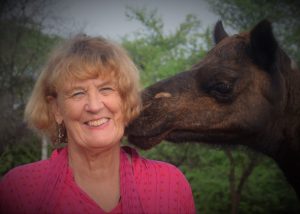
Ilse Köhler-Rollefson is a doctor of veterinary medicine, author, and activist for pastoral cultures around the world. She has spent the last 30 years living among the Raika camel herders in Rajasthan, India. In her new book Hoofprints on the Land: How Traditional Herding and Grazing Can Restore the Soil and Bring Animal Agriculture Back in Balance with the Earth, she traces the history and present-day reality of herding societies. Living lightly on the earth, they have a deep and mutual relationship with their animals, who in turn fertilize fields, eat unwanted weeds and plants, and produce healthy and delicious meat and dairy.
3’45 defining pastoralism
5’08 Navajo pastoralists got their sheep from the Spanish
6’27 varying degrees of nomadism
7’03 working with agricultural cycles
7’40 “domestication” redefined
8’30 animal-human communication
10’37 focus on the welfare of the animals first and foremost
11’04 pastoralists more humane and understand the cycles of life
12’00 the problem with precision and metric-based farming–it’s not adaptive
13’33 Ilse’s background and how she came to study and live among pastoralists
14’21 saw the exploitation of thoroughbred horses in Kentucky
14’59 fell in love with camels
15’25 worked as an archaeozoologist
15’56 watching the unraveling of camel herding cultures in real time in India, and working to revive herding cultures
17’03 young people coming back from the city during the pandemic and realizing that their lives as herders were good
17’41 money is good if you keep sheep and goats, but the respect isn’t there
19’29 the kind of lands that pastoralists make use of
20’26 all the different animals that pastoralists graze
21’42 sheep herding cultures that worship wolves
23’14 pastoralism as biomimicry, mimicking the migration of wild animals
23’55 pastoralim inside the crop agriucltural system
24’22 manure works so much better than chemical fertilizers on the crop fields, and the pastoralists provide it
25’30 camels eating thistles that plague farmers, and producing sweet and healthy milk
26’40 camel milk helping autistic children and helping with a lot of other illnesses
28’18 camel milk and other pastoral foods contain nutrients not in processed or industrial food
30’06 challenges of pastoralists in the modern world, due to colonialism and industrialization
32’33 pastoralists getting kicked off land for conservation parks
34’04 if pastoralists and indigenous people could manage conservation land it would be great, but that’s not the trend in conservation
34’37 2026 is the international year of rangeland pastoralists
35’29 similarities between regenerative grazing and pastoralism, they could join together
36’43 pastoralists getting together in conferences, who can communicate even without a common verbal language
37’50 the next generation of young people going into grazing even without a background in agriculture
38’44 herding is a full time job with no vacations or sick time, so we need to find structures that work in the modern world
40’09 pastoralism takes carbon from above the ground, sequesters it in the soil, and in the process produces healthy meat and dairy–with large climate implications
41’35 the dangers of putting pastoralism in the hands of corporate interests
43’10 in the US industrial cattle system, more protein goes into animals through their feed than comes out through their meat. In pastoral systems it’s the opposite
44’25 the calculation of industrial meat and dairy production totally ignores the externalities like animal welfare, pollution, fossil fuel use, etc.
45’08 the animal science world needs to get a more holistic perspective
45’52 source your food from regenerative systems
46’47 natural systems are composed of plants and animals, you can’t have healthy land with only plants
48’16 cruelty-free dairy–baby animals stay with their mothers, animals are moved and stay close to their herders
48’47 https://www.camelcharisma.com
49’30 2024 is the international year of camelids
50’20 the dangers of camel industrialization, avoid those mistakes
51’00 35% discount at ChelseaGreen.com if you use CODE CGP35 at checkout.



Subscribe:
Apple Podcasts
Spotify